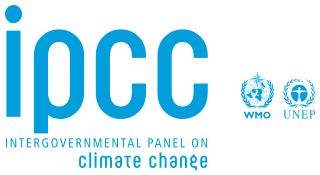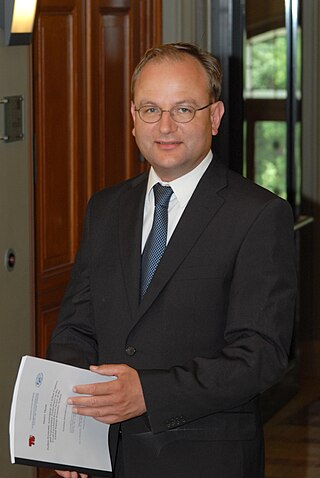
The Intergovernmental Panel on Climate Change (IPCC) is an intergovernmental body of the United Nations. Its job is to advance scientific knowledge about climate change caused by human activities. The World Meteorological Organization (WMO) and the United Nations Environment Programme (UNEP) established the IPCC in 1988. The United Nations endorsed the creation of the IPCC later that year. It has a secretariat in Geneva, Switzerland, hosted by the WMO. It has 195 member states who govern the IPCC. The member states elect a bureau of scientists to serve through an assessment cycle. A cycle is usually six to seven years. The bureau selects experts to prepare IPCC reports. It draws the experts from nominations by governments and observer organisations. The IPCC has three working groups and a task force, which carry out its scientific work.
Drew Shindell is a physicist and a climate specialist and professor at Duke University's Nicholas School of the Environment. He is listed as an ISI Highly Cited Researcher. He was a chapter lead of the Intergovernmental Panel on Climate Change (IPCC) October 8, 2018 Special Report on Global Warming of 1.5 °C as well as on the Intergovernmental Panel on Climate Change's Fifth Assessment Report in 2013. He has testified on climate issues before both houses of the US Congress, at the request of both parties. His research concerns natural and human drivers of climate change, linkages between air quality and climate change, and the interface between climate change science and policy. He has been an author on more than 200 peer-reviewed publications and received awards from Scientific American, NASA, the EPA, and the NSF.

The International Institute for Applied Systems Analysis (IIASA) is an independent international research institute located in Laxenburg, near Vienna, in Austria. Through its research programs and initiatives, the institute conducts policy-oriented interdisciplinary research into issues too large or complex to be solved by a single country or academic discipline. This includes pressing concerns that affect the future of humanity, such as climate change, energy security, population aging, and sustainable development. The results of IIASA research and the expertise of its researchers are made available to policymakers in countries around the world to help them produce effective policies that will enable them to face these challenges.

The economics of climate change concerns the economic aspects of climate change; this can inform policies that governments might consider in response. A number of factors make this and the politics of climate change a difficult problem: it is a long-term, intergenerational problem; benefits and costs are distributed unequally both within and across countries; and both the scientific consensus and public opinion on climate change need to be taken into account.
Wim C. Turkenburg is emeritus professor 'Science, Technology & Society' (STS) at Utrecht University, the Netherlands, and owner of a consultancy on energy and environmental issues. He is member of the board of the Foundation Preparation Pallas reactor as well as member of some advisory and programming committees on issues ranging from nuclear waste management and the safety of nuclear power plants and natural gas exploitation to RD&D programming in the field of bioenergy and biomaterials. In addition he communicates regularly on energy issues in public media.

African environmental issues are caused by human impacts on the natural environment and affect humans and nearly all forms of life. Issues include deforestation, soil degradation, air pollution, water pollution, garbage pollution, climate change and water scarcity. These issues result in environmental conflict and are connected to broader social struggles for democracy and sovereignty.
An emission inventory is an accounting of the amount of pollutants discharged into the atmosphere. An emission inventory usually contains the total emissions for one or more specific greenhouse gases or air pollutants, originating from all source categories in a certain geographical area and within a specified time span, usually a specific year.

The IPCC Fourth Assessment Report (AR4) is a report on climate change created with the help of a large number of contributors, both scientists and governmental representatives. There has been considerable political controversy over a small number of errors found in the report, and there have been calls for review of the process used to formulate the report. The overwhelming majority view of scientists with expertise in climate change is that errors, when found, are corrected, and the issues as identified do not undermine the conclusions of the report that the climate system is warming in response to increased levels of greenhouse gases, largely due to human activities.
Pier Vellinga is an environmental scientist and one of the Netherlands' experts on the impacts of climate change.

The Potsdam Institute for Climate Impact Research is a German government-funded research institute addressing crucial scientific questions in the fields of global change, climate impacts, and sustainable development. Ranked among the top environmental think tanks worldwide, it is one of the leading research institutions and part of a global network of scientific and academic institutions working on questions of global environmental change. It is a member of the Leibniz Association, whose institutions perform research on subjects of high relevance to society.

Ottmar Georg Edenhofer is a German economist who is regarded as one of the world's leading experts on climate change policy, environmental and energy policy, and energy economics. His work has been heavily cited. Edenhofer currently holds the professorship of the Economics of Climate Change at the Technical University of Berlin. Together with Earth scientist Johan Rockström, economist Ottmar Edenhofer is scientific director of the Potsdam Institute for Climate Impact Research (PIK), representing the interdisciplinary and solutions-oriented approach of the institute. Furthermore, he is director of the Mercator Research Institute on Global Commons and Climate Change (MCC). From 2008 to 2015 he served as one of the co-chairs of the Intergovernmental Panel on Climate Change (IPCC) Working Group III "Mitigation of Climate Change".

The economics of climate change mitigation is the part of the economics of climate change related to climate change mitigation, that is actions that are designed to limit the amount of long-term climate change. Mitigation may be achieved through the reduction of greenhouse gas (GHG) emissions and the enhancement of sinks that absorb GHGs, for example forests.

Climate change scenarios or socioeconomic scenarios are projections of future greenhouse gas (GHG) emissions used by analysts to assess future vulnerability to climate change. Scenarios and pathways are created by scientists to survey any long term routes and explore the effectiveness of mitigation and helps us understand what the future may hold this will allow us to envision the future of human environment system. Producing scenarios requires estimates of future population levels, economic activity, the structure of governance, social values, and patterns of technological change. Economic and energy modelling can be used to analyze and quantify the effects of such drivers.

Climate change and poverty are deeply intertwined because climate change disproportionally affects poor people in low-income communities and developing countries around the world. Those in poverty have a higher chance of experiencing the ill-effects of climate change due to the increased exposure and vulnerability. Vulnerability represents the degree to which a system is susceptible to, or unable to cope with, adverse effects of climate change including climate variability and extremes.
Michael Calvin MacCracken, has been chief scientist for climate change programs with the Climate Institute in Washington, D.C., since 2002; he was also elected to its board of directors in 2006.

The contributions of women in climate change have received increasing attention in the early 21st century. Feedback from women and the issues faced by women have been described as "imperative" by the United Nations and "critical" by the Population Reference Bureau. A report by the World Health Organization concluded that incorporating gender-based analysis would "provide more effective climate change mitigation and adaptation."
William R. Moomaw is the Professor Emeritus of International Environmental Policy at the Fletcher School, Tufts University. Moomaw has worked at the intersection of science and policy, advocating for international sustainable development. His activities have included being a long-time contributor to the Intergovernmental Panel on Climate Change and an author on the seminal "Perspective" paper on proforestation.

Co-benefits of climate change mitigation are the positive benefits related to mitigation measures which reduce greenhouse gas emissions or enhance carbon sinks. The beneficial or adverse impacts of deploying climate-change mitigation measures are highly context-specific and also depend on the scale. With regards to the transport sector, possible co-benefits of mitigation strategies include: air quality improvements, health benefits, equitable access to transportation services, reduced traffic congestion, and reduced material demand. For example, measures promoting walkable urban areas can create health co-benefits from cleaner air and benefits from enhanced mobility. The increased use of green and blue infrastructure can reduce the urban heat island effect and heat stress on people, which will improve the mental and physical health of urban dwellers. Country-specific co-benefits can include biodiversity conservation, ecosystem services, and livelihoods.

Youba SokonaFAAS FTWAS (born 23 May 1950) is a Malian expert in the fields of energy and sustainable development, particularly in Africa. He has been the vice-chair of the Intergovernmental Panel on Climate Change (IPCC) since October 2015 and a lead author at the IPCC since 1990.











